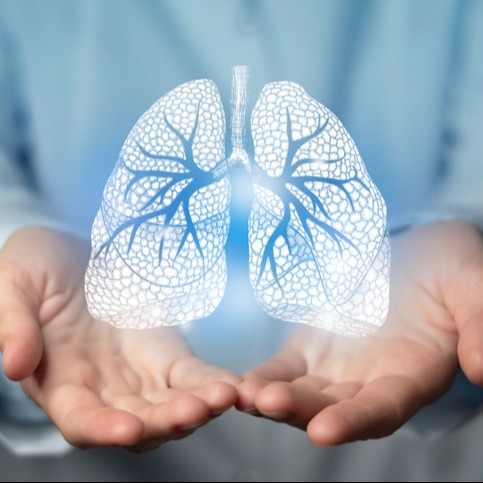
COPD is a common but treatable lung disease that affects more than 175 million people worldwide, and in 2015 alone, COPD was responsible for at least 3.2 million deaths. These statistics are likely worse than reported because underreporting of COPD is common. Currently, COPD is the third leading cause of disability and death worldwide. This article will review the basics of COPD, how it is diagnosed, and, most importantly, how it is prevented and treated.
Understanding COPD
COPD is a progressive lung disease that obstructs airflow, making it increasingly difficult to breathe. In COPD, the airways and air sacs in the lungs become damaged, leading to breathing difficulties.
COPD typically develops due to long-term exposure to irritants that damage the lungs and airways. Smoking, including active smoking and exposure to secondhand smoke, is the primary cause of COPD. Prolonged exposure to other lung irritants like air pollution, chemical fumes, and dust in the workplace can also contribute significantly. Genetic factors can play a role, particularly in individuals with a deficiency in a protein called alpha-1 antitrypsin, which can predispose them to COPD. Some respiratory infections during childhood and a history of asthma can increase the risk of developing COPD later in life. Other risk factors include aging (as lung function naturally declines with age) and a history of frequent respiratory infections.
The symptoms of COPD include a persistent cough, wheezing, shortness of breath, and chest tightness. These symptoms can profoundly impact the quality of life and worsen over time. The constant coughing can be disruptive, causing fatigue and interrupting activities. Breathing difficulties, especially during physical exertion, limit mobility and affect the ability to perform routine tasks. Simple activities like climbing stairs or walking short distances become challenging. COPD symptoms also disrupt sleep, causing fatigue and impacting concentration and productivity during the day. The emotional toll of living with a chronic condition, coupled with the anxiety and stress related to breathing difficulties, can significantly affect mental health and overall well-being.

Diagnosing COPD
Diagnosing COPD involves a series of steps to assess lung function and rule out conditions with similar symptoms (e.g., asthma or heart failure). Spirometry is the primary test used to diagnose COPD. It measures how much air you can breathe in and out and how fast you can exhale, helping determine the severity of airflow limitation. Imaging tests like chest X-rays or CT scans can also visualize the lungs and rule out other lung conditions or complications. Blood tests might be conducted to check oxygen levels and determine if another condition, such as alpha-1 antitrypsin deficiency, contributes to COPD. Sometimes, additional tests, such as arterial blood gas analysis, might be performed to assess how well the lungs deliver oxygen to the blood. A comprehensive evaluation involving a review of medical history, physical exams, and various tests is crucial for an accurate COPD diagnosis.
Managing COPD
Treatment for COPD aims to manage symptoms, improve quality of life, and slow disease progression. Medications commonly prescribed for COPD include budesonide and formoterol. Formoterol helps relax the muscles around the airways, and budesonide reduces inflammation. Pulmonary rehabilitation programs are crucial components of COPD management, involving exercise training, breathing techniques, education on managing the condition, and nutritional counseling to enhance overall health. Oxygen therapy may be recommended in cases where blood oxygen levels are low. Vaccinations, including flu and pneumonia, are also essential to prevent respiratory infections that can exacerbate COPD symptoms. Tailored treatment plans, often a combination of these approaches, are designed based on individual needs and the severity of COPD. Regular monitoring and adjustments to the treatment plan are crucial for effective management. In severe cases, surgical interventions like lung volume reduction surgery or lung transplantation might be considered.

Tips for Enhancing Quality of Life
Early detection and seeking medical advice for COPD are pivotal in managing the condition effectively and improving long-term outcomes. Detecting COPD in its early stages allows for timely intervention, potentially slowing the progression of the disease and preventing further lung damage. Seeking medical advice promptly upon experiencing symptoms like a persistent cough, shortness of breath, or wheezing is crucial, especially for individuals with risk factors like a history of smoking or prolonged exposure to lung irritants. Early intervention helps manage symptoms and empowers individuals with COPD to make lifestyle changes, access pulmonary rehabilitation, and adopt strategies that can significantly enhance their ability to lead an active life while minimizing the impact of the disease. Regular monitoring and early medical intervention are vital in managing COPD and improving outcomes.
Looking Toward the Future
Current research in COPD treatment has explored various avenues to improve therapies and potentially discover cures. Advancements in treatment include the development of targeted medications. Innovative techniques like pulmonary rehabilitation programs and lung volume reduction surgeries have shown promise in enhancing the quality of life for COPD patients. Several initiatives focus on personalized medicine approaches, aiming to tailor treatments based on individual patient characteristics. While a definitive cure for COPD remains elusive, these advancements offer hope for better management and improved outcomes. For those living with COPD, staying informed about these breakthroughs and actively participating in personalized treatment plans can provide valuable encouragement and empowerment in managing their condition. In addition to medical interventions, robust support networks, positive lifestyle modifications, and strict adherence to prescribed therapies also play pivotal roles in maintaining a positive outlook and enhancing overall well-being while living with COPD.
Rely on PlanetDrugsDirect.com to Buy Your COPD Prescription Discount Drugs Online
As a trusted prescription referral service, we offer important benefits whenever you order online. Each of our partner pharmacies and/or government-approved dispensaries is committed to providing the best experience possible of any online prescription referral service on the internet. We offer:
Low prices
Quick turn-around times
Generic and brand-name medications
Unparalleled customer service
Sources
https://pubmed.ncbi.nlm.nih.gov/26494423/
https://pubmed.ncbi.nlm.nih.gov/35533707/
https://pubmed.ncbi.nlm.nih.gov/34342835/
https://pubmed.ncbi.nlm.nih.gov/34342835/
https://pubmed.ncbi.nlm.nih.gov/35142480/
https://pubmed.ncbi.nlm.nih.gov/36510486/
 Medically reviewed by
Medically reviewed by 


